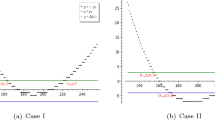Abstract
In RSA equation: ed = k·φ(N) + 1, we may guess on partial bits of d or p + q by doing an exhaustive search to further extend the security boundary of d. In this paper, we discuss the following question: Does guessing on p + q bring more benefit than guessing on d? We provide the detailed analysis on this problem by using the lattice reduction technique. Our analysis shows that leaking partial most significant bits (MSBs) of p + q in RSA risks more than leaking partial MSBs of d. This result inspires us to further extend the boundary of the Boneh-Durfee attack to N 0.284 + Δ, where ”Δ” is contributed by the capability of exhaustive search. Assume that doing an exhaustive search for 64 bits is feasible in the current computational environment, the boundary of the Boneh-Durfee attack should be raised to d < N 0.328 for an 1024-bit RSA modulus. This is a 37 bits improvement over Boneh and Durfee’s boundary.
Access this chapter
Tax calculation will be finalised at checkout
Purchases are for personal use only
Preview
Unable to display preview. Download preview PDF.
Similar content being viewed by others
References
Boneh, D., Durfee, G.: Cryptanalysis of RSA with Private Key d Less than N 0.292. In: Stern, J. (ed.) EUROCRYPT 1999. LNCS, vol. 1592, pp. 1–11. Springer, Heidelberg (1999)
Coppersmith, D.: Small solutions to polynomial equations, and low exponent RSA vulnerabilities. Journal of Cryptology 10, 233–260 (1997)
Coppersmith, D., Franklin, M., Patarin, J., Reiter, M.: Low-Exponent RSA with Related Messages. In: Maurer, U.M. (ed.) EUROCRYPT 1996. LNCS, vol. 1070, pp. 1–9. Springer, Heidelberg (1996)
Ernst, M., Jochemsz, E., May, A., de Weger, B.: Partial Key Exposure Attacks on RSA up to Full Size Exponents. In: Cramer, R. (ed.) EUROCRYPT 2005. LNCS, vol. 3494, pp. 371–386. Springer, Heidelberg (2005)
Rivest, R., Shamir, A., Aldeman, L.: A Method for Obtaining Digital Signatures and Public-Key Cryptosystems. Communications of the ACM 21(2), 120–126 (1978)
Verheul, E., van Tilborg, H.: Cryptanalysis of less short RSA secret exponents. Applicable Algebra in Engineering, Communication and Computing 8, 425–435 (1997)
Wiener, M.J.: Cryptanalysis of RSA with short secret exponents. IEEE Transactions on Information Theory IT-36, 553–558 (1990)
Author information
Authors and Affiliations
Editor information
Editors and Affiliations
Rights and permissions
Copyright information
© 2012 Springer-Verlag Berlin Heidelberg
About this paper
Cite this paper
Wu, ME., Tso, R., Sun, HM. (2012). Cryptanalysis of Exhaustive Search on Attacking RSA. In: Xu, L., Bertino, E., Mu, Y. (eds) Network and System Security. NSS 2012. Lecture Notes in Computer Science, vol 7645. Springer, Berlin, Heidelberg. https://doi.org/10.1007/978-3-642-34601-9_28
Download citation
DOI: https://doi.org/10.1007/978-3-642-34601-9_28
Publisher Name: Springer, Berlin, Heidelberg
Print ISBN: 978-3-642-34600-2
Online ISBN: 978-3-642-34601-9
eBook Packages: Computer ScienceComputer Science (R0)




